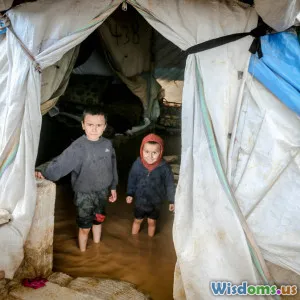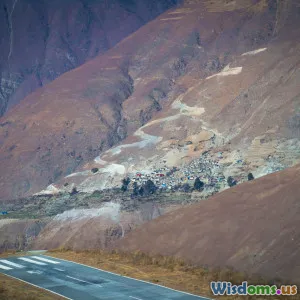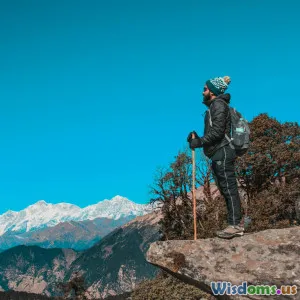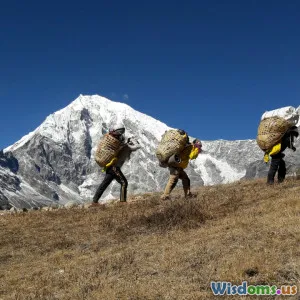
How to Safely Volunteer in Remote Locations Without Prior Experience
8 min read Discover how to volunteer safely in remote locations without prior experience through practical tips, thorough preparation, and essential safety guidelines. (0 Reviews)
How to Safely Volunteer in Remote Locations Without Prior Experience
Volunteering in remote, often underserved locations can be a powerful and rewarding experience, opening your eyes to new cultures while allowing you to make a tangible difference. However, for those without prior experience, the prospect may feel daunting and fraught with concerns regarding safety, health, and efficacy.
This article provides a comprehensive roadmap that enables novices to enter the field of remote volunteering confidently and carefully, ensuring that their motivations translate into meaningful and secure contributions.
Understanding the Challenges and Rewards
Remote volunteering typically involves working in rural or isolated communities, often in developing regions, where resources are limited, and accessibility can be challenging. Such environments require volunteers to be adaptable, prepared for unexpected situations, and culturally sensitive.
The Rewards
-
Personal Growth: Volunteers often report enhanced empathy, self-reliance, and cross-cultural understanding.
-
Community Impact: Well-prepared volunteers bring important skills to projects addressing areas like education, healthcare, conservation, or infrastructure.
-
Global Awareness: Exposure to different voices and histories inspires lifelong commitments to social responsibility.
The Challenges
-
**Health Risks:**places with limited healthcare access present increased medical risks.
-
Logistical Barriers: remoteness introduces transportation and communication difficulties.
-
Safety Concerns: understanding local political or environmental risks is crucial.
-
Lack of Experience: navigating cultural contexts and practical tasks without guidance can hinder contribution.
Preparing for a Remote Volunteering Experience
Research and Project Selection
Choose organizations with a solid reputation, transparent agendas, and clear volunteer support systems. Reputable platforms such as VolunteerMatch, GlobalGiving, and Projects Abroad vet their programs and often require volunteers to participate in orientation or training.
Example: An NGO focused on education in rural Nepal might offer beginner volunteers structured teaching curricula and local mentors, carefully ensuring volunteers' fit for community needs.
Health Precautions
-
Medical Check-Up: Prior consultations with travel or tropical medicine professionals are essential.
-
Vaccinations: Make sure all recommended vaccines (e.g., Hepatitis A and B, Typhoid, Yellow Fever) are up to date.
-
First Aid Training: Even basic first aid knowledge can be invaluable in emergencies.
The Centers for Disease Control and Prevention (CDC) offers travel health notices and vaccine guidelines tailored by region.
Physical Fitness and Mental Preparation
Remote volunteering can demand physically rigorous tasks or exposure to challenging climates. Building stamina and resilience beforehand reduces health risks.
Mental readiness to handle culture shock, loneliness, or unstructured days is equally important. Reading volunteer testimonials or practicing mindfulness techniques has proven effective among novices.
Financial and Logistical Planning
Understanding the full cost is key—flights, accommodations, daily expenses, medical insurance, and emergency funds add up quickly. Some volunteer programs require contribution fees; ascertain what services they cover.
Arrange communication methods, such as satellite phones or local SIM cards, to maintain contact with family or emergency services.
On-the-Ground Safety Strategies
Cultural Sensitivity and Community Engagement
Respecting local customs fosters trust and cooperation. Simple acts like learning greeting etiquette, local dress codes, and basic language phrases can bridge divides.
Example: In many Indigenous communities in Amazonian regions, consulting local elders before starting a project honors tradition and paves the way for collaboration.
Living Arrangements and Personal Security
Opt for accommodations recommended by the hosting organization or trusted sources. Shared housing with other volunteers or local families enhances security and cultural immersion.
Maintain situational awareness—avoid isolated areas, secure valuables, and keep updated on local news about any security or weather advisories.
Worksite Safety
Understand the specific risks related to your volunteering task. For instance, conservation projects might involve risks from wildlife or harsh terrain; construction projects require protective equipment.
Never hesitate to ask supervisors for proper training or tools to perform tasks safely.
Emergency Preparedness
-
Memorize the location and contact information for the nearest medical facility.
-
Establish a local emergency contact and share your itinerary with family or friends.
-
Know how to reach your embassy or consulate.
Learning and Contributing Without Prior Experience
Emphasize Willingness Over Expertise
Organizations often value enthusiasm and a collaborative spirit. Be transparent about your skill level and seek tasks appropriate to your background.
Take Advantage of Training Opportunities
Many programs include orientation sessions that contextualize the community’s needs and teach basic skills relevant to your assignment.
Engage in Observation and Listening
Carefully observe how locals carry out daily tasks and ask questions respectfully. Local knowledge often holds the key to effective solutions.
Leverage Transferable Skills
Even non-specialists bring valuable skills: organizational abilities, basic literacy teaching, general labor, or simply positive interpersonal interaction.
Insight: Dr. Lucy Parker from the International Volunteer Forum stresses, “The heart of volunteerism is service with humility and openness to learn, not necessarily professional credentials.”
Post-Volunteering: Reflecting and Planning Next Steps
Document and Share Your Experience
Keeping a journal or blog not only preserves memories but raises awareness within your network, potentially encouraging others.
Maintain Contact Respectfully
If appropriate, follow up with host organizations for feedback or future collaboration.
Evaluate Your Impact and Learnings
Consider evaluating what worked well and what could improve to enhance effectiveness in future volunteering.
Pursue Skill Development
Build on your experience by acquiring relevant certifications, language skills, or further training, preparing you for future assignments.
Conclusion
Volunteering in remote locations without prior experience may initially seem intimidating, but with detailed preparation, realistic expectations, and cultural respect, it can be a highly enriching and safe endeavor. Remember, the goal is not only to give but also to grow through cross-cultural engagement and mutual learning. By thoughtfully choosing projects, prioritizing health and safety, and nurturing community connections, new volunteers can confidently embark on their journey toward making a meaningful difference in some of the world's most remote communities.
Begin your volunteering adventure well-informed and enthusiastic—the world is waiting for your contribution, however humble it may begin!
Sources:
- Centers for Disease Control and Prevention (CDC) travel recommendations
- VolunteerMatch.org
- Projects Abroad Volunteer Testimonials
- International Volunteer Forum
Rate the Post
User Reviews
Popular Posts




















